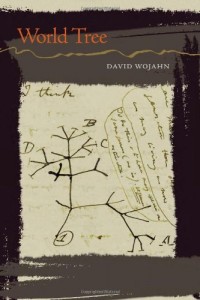 World Tree
World Tree
by David Wojahn
University of Pittsburgh Press, 2011
144 pages / $14.36 buy from Amazon
Rating: 8.5
“The central feature of the human existence is the existence of the unconscious, the existence of a reality of which we are unconscious.”—N.O. Brown
“Poetry, then, is about the extending of human consciousness, making conscious the unconscious, creating a symbolic consciousness that in its finest moments overcomes all the dualities in which the human world is cruelly and eternally, it seems, enmeshed.”—Clayton Eshleman
David Wojahn’s 2011 collection World Tree holds a light to dark stories past and present, expanding new realities from cave walls.
Wojahn looks at places beyond the standard Hollywood or Netflix imagery, (Cystic Fibrosis, ALS, Diabetes, the Anasazi, afterbirth, the foaming sewers of St. Paul, digitized Berryman, green marbles of Cherries in cluster, Helmut province, Houston TX, after Katrina) and with this lot he sounds a white-hot lament.
He directs one poem at Wayne LaPierre: “Someone filed off the serial number of the Glock. Someone bought it/& sold it & someone else/ sold it again & thus Howard Reed Scott II, 17, shot Tyler Binsted,/ 19, by the tennis courts in Byrd Park,/ 1 a.m. on a rainy Thursday, a robbery gone afoul. You were asleep/ in beltway Maryland then”
In a 2012 interview with University of Wisconsin Madison’s Devil’s Lake he expanded on the project.
“When powerful forces in our society want to so debase civil discourse and so demean the language, poetry may seem like a pretty paltry counter-force to those tendencies. But one thing I believe about verse is that it tries to speak some sort of essential truth to power, even if relatively few people hear that speech.”
The most compelling poem in the collection, called “Ochre,” is fifty pages interspersed photo and caption, drawing on images throughout human history (Iraq 10,000 BC and Iraq 2004) emphasizing recurring forms and fascinations. He says,
“Those images on the walls of Chauvet or Lascaux testify to the immensity and breadth of the human imagination going back as far as thirty thousand years ago. They testify that we have a chance, however small, for some sort of afterlife, that there can be some shard or remnant, something excavated or stumbled upon—that says we were here, and that our existences somehow mattered.”
From cave art to the poet’s father in WW2, this project recalls the best poets of Jungian sensibilities (Olson, Eshelman). Wojahn considers the bliss and despair of erotic compulsion, and compels us towards something like compassion.
Tags: David Wojahn, University of Pittsburgh Press, World Tree
